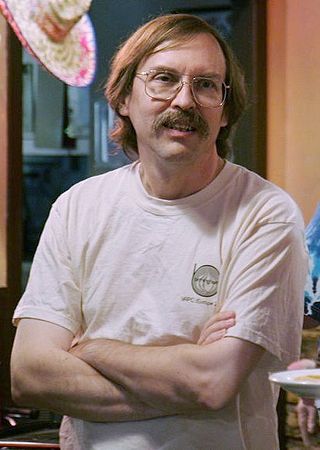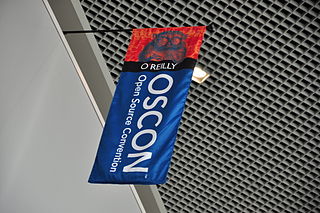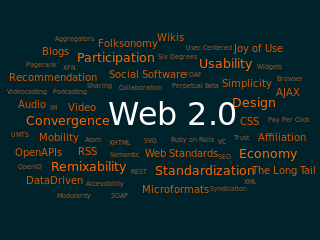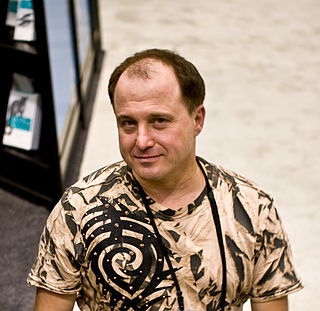
Larry Arnold Wall is an American computer programmer, linguist and author. He is best known for creating the Perl programming language and the patch tool.

Perl is a high-level, general-purpose, interpreted, dynamic programming language. Though Perl is not officially an acronym, there are various backronyms in use, including "Practical Extraction and Reporting Language".

Randal L. Schwartz, also known as merlyn, is an American author, system administrator and programming consultant. He has written several books on the Perl programming language, and plays a promotional role within the Perl community. He was a co-host of FLOSS Weekly.

Timothy O'Reilly is an Irish-American author and publisher, who is the founder of O'Reilly Media. He popularised the terms open source and Web 2.0.

Programming Perl, best known as the Camel Book among programmers, is a book about writing programs using the Perl programming language, revised as several editions (1991–2012) to reflect major language changes since Perl version 4. Editions have been co-written by the creator of Perl, Larry Wall, along with Randal L. Schwartz, then Tom Christiansen and then Jon Orwant. Published by O'Reilly Media, the book is considered the canonical reference work for Perl programmers. With over 1,000 pages, the various editions contain complete descriptions of each Perl language version and its interpreter. Examples range from trivial code snippets to the highly complex expressions for which Perl is widely known. The camel book editions are also noted for being written in an approachable and humorous style.

Brad Templeton is a Canadian software developer, internet entrepreneur, online community pioneer, publisher of news, comedy, science fiction and e-books, writer, photographer, civil rights advocate, futurist, public speaker, educator and self-driving car consultant. He graduated from the University of Waterloo.

UBM plc was a British business-to-business (B2B) events organiser headquartered in London, England, before its acquisition by Informa in 2018. It had a long history as a multinational media company. Its main focus was on B2B events, but its principal operations included live media and business-to-business communications, marketing services and data provision, and it principally served the technology, healthcare, trade and transport, ingredients and fashion industries. UBM was listed on the London Stock Exchange and was a constituent of the FTSE 250 Index.

The O'Reilly Open Source Convention (OSCON) was an American annual convention for the discussion of free and open-source software. It was organized by publisher O'Reilly Media and was held each summer, mostly in Portland, Oregon, from 1999 to 2019.

Web 2.0 refers to websites that emphasize user-generated content, ease of use, participatory culture and interoperability for end users.

LAMP is an acronym denoting one of the most common software stacks for the web's most popular applications. Its generic software stack model has largely interchangeable components.
Pearson Education, known since 2011 as simply Pearson, is the educational publishing and services subsidiary of the international corporation Pearson plc. The subsidiary was formed in 1998, when Pearson plc acquired Simon & Schuster's educational business and combined it with Pearson's existing education company Addison-Wesley Longman. Pearson Education was restyled as simply Pearson in 2011. In 2016, the diversified parent corporation Pearson plc rebranded to focus entirely on education publishing and services, and as of 2023 Pearson Education is Pearson plc's main subsidiary.
Make is an American magazine published since February 2005 which focuses on Do It Yourself (DIY) and/or Do It With Others (DIWO) projects involving computers, electronics, metalworking, robotics, woodworking and other disciplines. The magazine is marketed to people who enjoyed making things and features complex projects which can often be completed with cheap materials, including household items. Make is considered "a central organ of the maker movement".
Ashish Gulhati author, philosopher, notable for being one of India's first online activists and open source hackers.

Dale Dougherty is a co-founder of O'Reilly Media, along with Tim O'Reilly. While not at the company in its earliest stages as a technical documentation consulting company, Dale was instrumental in the development of O'Reilly's publishing business. He is the author of the O'Reilly book sed & awk.
Miller Freeman, Inc., was a San Francisco–based publisher of trade books and business magazines, as well as a manager of trade and industry expositions. It was an innovative force in business technology and communications in the 1990s until its breakup in 2000. A substantial part of the company was owned by UBM which is now owned by Informa.
UBM Technology Group, formerly CMP Publications, was a business-to-business multimedia company that provided information and integrated marketing services to technology professionals worldwide. It offered marketers and advertisers services such as print, newsletters, custom web sites, and events. Its products and services include newspapers, magazines, Internet products, research, education and training, trade shows and conferences, direct marketing services and custom publishing.

InformationWeek is a digital magazine which conducts corresponding face-to-face events, virtual events, and research. It is headquartered in San Francisco, California and was first published in 1985 by CMP Media, later called Informa. The print edition of the magazine has ceased, with the last issue published on June 24, 2013.

Byte was a microcomputer magazine, influential in the late 1970s and throughout the 1980s because of its wide-ranging editorial coverage.

Jennifer Pahlka is an American businesswoman and political advisor. She is the founder and former Executive Director of Code for America. She served as US Deputy Chief Technology Officer from June 2013 to June 2014 and helped found the United States Digital Service. Previously she had worked at CMP Media with various roles in the computer game industry. She was the co-chair and general manager of the Web 2.0 conferences. In June 2023, she released the book Recoding America: Why Government Is Failing in the Digital Age and How We Can Do Better.

Thomas S. "Tom" Christiansen, nicknamed tchrist or occasionally thoth, is a Unix developer and user known for his work with the Perl programming language.
















